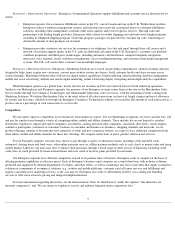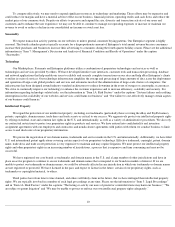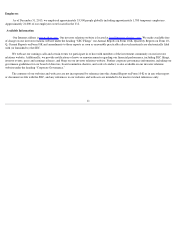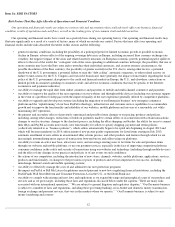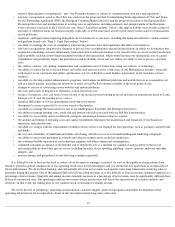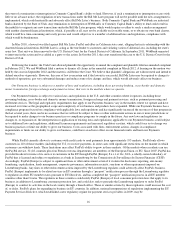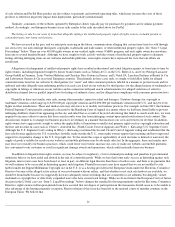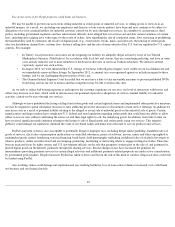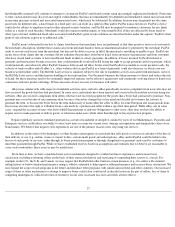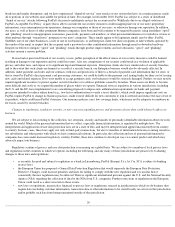eBay 2013 Annual Report Download - page 21
Download and view the complete annual report
Please find page 21 of the 2013 eBay annual report below. You can navigate through the pages in the report by either clicking on the pages listed below, or by using the keyword search tool below to find specific information within the annual report.
U.S. regulators have increased their scrutiny of compliance with these obligations. New and existing anti-money laundering and counter-
terrorist
financing regulations may require PayPal to further revise or expand its compliance program, including the procedures it uses to verify the
identity of its customers and to monitor international and domestic transactions.
Several countries in which PayPal is regulated, including Australia, Japan, Luxembourg, and Singapore, have implemented new anti-
money laundering and counter-terrorist financing laws and regulations, and PayPal has had to make changes to its compliance program in
response. In November 2009, the Australian anti-money laundering and counter-terrorist financing regulator (AUSTRAC) accepted an
enforceable undertaking from PayPal Australia pursuant to which PayPal Australia agreed, among other things, to appoint an independent
auditor to assess PayPal Australia's anti-money laundering compliance policies and procedures and issue a report identifying any unremediated
deficiencies accompanied by a plan by PayPal to remedy any such deficiencies. Pursuant to the remediation plan submitted by PayPal Australia
and accepted by AUSTRAC, PayPal Australia was required to invest in significant improvements to its anti-money laundering and counter-
terrorist financing systems, policies and operations. AUSTRAC formally notified PayPal of the completion of the enforceable undertaking in
early 2013. As PayPal continues to localize its services in additional jurisdictions, it could be required to meet standards similar to or more
burdensome than those in Australia. In June 2013, the Monetary Authority of Singapore (MAS) requested that PayPal submit a Global Anti-
Money Laundering and Counter-Terrorist Financing Risk Assessment Report (Risk Report). After the submission of the Risk Report, the MAS
requested that PayPal submit a Global Anti-Money Laundering and Counter-Terrorist Financing Risk Management Proposal (Proposal). PayPal
must submit the Proposal by the end of March 2014. The MAS could require modifications to PayPal's existing compliance program as a
condition of approving a Proposal. The European Commission has also announced a consultation process to consider revisions to the European
Anti-Money Laundering Directive. These requirements, together with any new requirements or changes to existing requirements, could impose
significant costs on PayPal, result in delays to planned product improvements, make it more difficult for new customers to join its network and
reduce the attractiveness of its products.
Our Payments business is subject to consumer protection laws and regulations.
Our Payments business is subject to consumer protection laws and regulations in the U.S. and other countries in which it operates. PayPal
is focused on compliance with these laws and regulations and has programs designed to comply with new and existing consumer protection
requirements. However, any errors, failures or delays in complying with such consumer protection laws and regulations could result in
significant criminal and civil lawsuits, penalties, forfeiture of significant assets or other enforcement actions. Any new consumer protection laws
and regulations (or changes to, or expansion of, the interpretation or application of existing laws and regulations) applicable to our Payments
business could subject us to additional laws and regulations, additional licensure requirements and increased regulatory scrutiny, which could
force us to change our business practices or limit our ability to grow our business. Costs associated with fines or enforcement actions, changes in
our compliance requirements or limitations on our ability to grow our business, could have an adverse effect on our financial results and harm
our Payments business.
Although there have been no definitive interpretations to date, PayPal has taken actions as though its service is subject to the Electronic
Fund Transfer Act and Regulation E of the U.S. Federal Reserve Board. Under such regulations, among other things, PayPal is required to
provide advance disclosure of changes to its service, to follow specified error resolution procedures and to reimburse consumers for losses from
certain transactions not authorized by the consumer. PayPal seeks to pass most of these losses on to the relevant merchants, but PayPal incurs
losses if the merchant does not have sufficient funds in its PayPal account. Additionally, even technical violations of these laws can result in
penalties of up to $1,000 for each non-compliant transaction or up to $500,000 per violation in any class action, and we could also be liable for
plaintiffs' attorneys' fees. In the second quarter of 2010, two putative class-action lawsuits (Devinda Fernando and Vadim Tsigel v. PayPal, Inc.
and Moises Zepeda v. PayPal, Inc.) were filed in the U.S. District Court for the Northern District of California. These lawsuits contain
allegations related to violations of aspects of the Electronic Fund Transfer Act and Regulation E and violations of a previous settlement
agreement related to Regulation E, and/or allege that PayPal improperly held users' funds or otherwise improperly limited users' accounts. These
lawsuits seek damages as well as changes to PayPal's practices, among other remedies. A determination that there have been violations of the
Electronic Fund Transfer Act, Regulation E or violations of other laws relating to PayPal's practices could expose PayPal to significant liability.
A lawsuit that has been filed by a consumer association in Germany also addresses PayPal’s practices to hold users’ funds and aims at more
transparency in the terms and conditions towards consumers as to when a user can expect PayPal to impose account limitations. Any changes to
PayPal's practices resulting from these lawsuits could require PayPal to incur significant costs and to expend substantial resources, which could
delay other planned product launches or improvements and further harm our business.
In January 2012, the Consumer Financial Protection Bureau (CFPB) finalized new rules under Regulation E, mandated by the Dodd-Frank
Act, which requires PayPal, starting in late October 2013, to provide additional disclosures, error resolution
19


